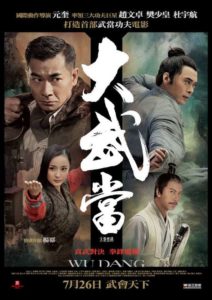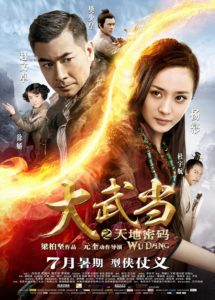Wu Dang
大武当之天地密码
China/Hong Kong, 2012, colour, 2.35:1, 100 mins.
Director: Liang Baijian 梁柏坚 [Patrick Leung].
Rating: 6/10.
Light action-adventure works OK as family fare but not much more than that.
Shanghai, early Republican China, 1920s. Professor Tang Yunlong (Zhao Wenzhuo), a widowed adventurer, returns to China from the US for the first time since he left during the Qing dynasty. He is sponsoring some 500th anniversary martial-arts games at a Daoist monastery in the Wudang mountains, Hubei province, in which his teenage daughter, Tang Ning (Xu Jiao), is to compete. En route to Shanghai’s railway station, Tang Yunlong stops off to advise a friend from the Manchu nobility on the purchase of a 2,000-year-old sword, reputed to have magical properties, that has long gone missing. The seller is an overseas Chinese arts trafficker, Paul Chen (Tan  Junyan), who is asking US$300,000. Tang Yunlong spots that the sword is a fake and narrowly escapes alive when Chen tries to kill him. However, Tang Yunlong manages to keep a coded Wudang treasure map he found in the sword’s box. Among those assembling for the games is Tian Xin (Yang Mi), a member of the clan who once owned the sword, who has been entrusted by her grandfather to recover it and has a copy of the same treasure map. Tian Xin and Tang Ning both win their initial heats in the games, though Tang Yunlong tells his daughter to take things more seriously. Searching separately in the mountains one night, Tang Yunlong and Tian Xin find a cave with some swords but are attacked by their guardian, monk Bai Long (Du Yuhang). Tang Yunlong and Tian Xin agree to join forces, with her keeping the sword and him keeping the rest of the treasure. Meanwhile, Tian Ning has got to know a young monk, Shui Heyi (Fan Shaohuang), who is being trained by the chief abbot, Xie (Fang Ping), in “sleeping kung-fu”. Tang Yunlong and Tian Xin try to decipher the secrets of the treasure map, but then Paul Chen turns up looking for revenge.
Junyan), who is asking US$300,000. Tang Yunlong spots that the sword is a fake and narrowly escapes alive when Chen tries to kill him. However, Tang Yunlong manages to keep a coded Wudang treasure map he found in the sword’s box. Among those assembling for the games is Tian Xin (Yang Mi), a member of the clan who once owned the sword, who has been entrusted by her grandfather to recover it and has a copy of the same treasure map. Tian Xin and Tang Ning both win their initial heats in the games, though Tang Yunlong tells his daughter to take things more seriously. Searching separately in the mountains one night, Tang Yunlong and Tian Xin find a cave with some swords but are attacked by their guardian, monk Bai Long (Du Yuhang). Tang Yunlong and Tian Xin agree to join forces, with her keeping the sword and him keeping the rest of the treasure. Meanwhile, Tian Ning has got to know a young monk, Shui Heyi (Fan Shaohuang), who is being trained by the chief abbot, Xie (Fang Ping), in “sleeping kung-fu”. Tang Yunlong and Tian Xin try to decipher the secrets of the treasure map, but then Paul Chen turns up looking for revenge.
REVIEW
Wu Dang 大武当之天地密码 is a period martial-arts adventure whose slim story and so-so protagonists are dwarfed by the spectacular setting of the eponymous mountains in central China. Seen as a family film aimed at young audiences, it works just fine, with good action (staged by Hong Kong veteran Yuan Kui 元奎 [Corey Yuen]), okay visual effects (revolving round an ancient magic sword), plain colloquial dialogue, and a plot that a five-year-old could follow. Largely made, like current [summer 2012] release The Four 四大名捕, by Hong Kongers using Mainland money and locations, it has a similarly routine, somewhat old-fashioned feel; unlike the more ambitious The Four, it at least knows what it is and gets the job done in a professional way.
The movie is the first feature in five years by Hong Kong director Liang Baijian 梁柏坚 [Patrick Leung], a onetime assistant to Wu Yusen 吴宇森 [John Woo] who also did second-unit work on Red Cliff 赤壁 (2008). Liang’s initial action dramas, like Somebody Up There Likes Me 浪漫风暴 (1996) and Beyond Hypothermia 摄氏32° (1996), had real personality, but during the past decade or so he’s become more of a genre journeyman (La Brassiere 绝世好Bra, 2001; Demi-Haunted 魂魄唔齐, 2002; The Twins Effect II 千机变II 花都大战, 2004). Wu Dang starts by looking like a lavish, period treasure-hunter adventure but soon gets strapped by the weak script by Hong Kong writer-producer Chen Han 陈汗, gaping plot holes, and lack of a budget appropriate to the production. As an adult action-drama, it doesn’t really cut the mustard. What keeps it watchable are the light leading performances by throaty Mainland hottie Yang Mi 杨幂 (in her first starring role), likeable Hong Kong actor-martial artist Fan Shaohuang 樊少皇 [Louis Fan], 14-year-old Mainland actress Xu Jiao 徐娇 (CJ7 长江七号, 2008; Starry Starry Night 星空, 2011) and even Mainland martial arts veteran Zhao Wenzhuo 赵文卓, who shows some signs of a mature personality here as an early 20th-century treasure hunter.
When he does leap into action, Zhao is as reliable as ever. Yang employs the same perky offhandedness that made her bird-spirit in Painted Skin: The Resurrection 画皮II (2012) so enjoyable and, though never remotely believable as a martial artist, goes through the moves okay. Yuan’s action sequences are the highlights, with slick use of wire-work, slo-mo and inventive choreography that actually advance the plot: in one sequence, Yang and Zhao’s characters start to bond in more ways than one, as do Fan and Xu’s characters in another. The score by Hong Kong veteran Luo Jian 罗坚 [Lincoln Lo] is acute, and editing by Zhang Jiahui 张嘉辉 [Cheung Ka-fai] very smooth throughout. But the real star is the Unesco World Heritage Site in northwest Hubei province, with its mountain peaks, precipitious Daoist monasteries and ethereal cloudscapes.
CREDITS
Presented by China Zhong Dian Media (CN), Mei Ah Media (Beijing) (CN), Xiao Xiang Film Group (CN), Mei Ah Film Production (HK). Produced by Mei Ah Media (Beijing) (CN), Mei Ah Film Production (HK).
Script: Chen Han. Photography: Zhang Dongliang [Tony Cheung]. Editing: Zhang Jiahui [Cheung Ka-fai]. Music: Luo Jian [Lincoln Lo]. Art direction: Huang Haiguang. Art advice: Huang Jia’neng [Eddy Wong]. Costume design: Guan Meibao (for Yang Mi: Wada Emi). Sound: Liu Lixin, He Wei. Action: Yuan Kui [Corey Yuen]. Martial arts: Liu Fang. Visual effects: Lu Yigang. Animation: Wang Zhengren.
Cast: Zhao Wenzhuo (Tang Yunlong, professor), Yang Mi (Tian Xin), Fan Shaohuang [Louis Fan] (Shui Heyi), Du Yuhang (Bai Long), Xu Jiao (Tang Ning, Tang Yunlong’s daughter), Bao Qijing [Paw Hee-ching] (Shui Heyi’s paralysed mother), Fang Ping (Xie, chief abbot), Tan Junyan [Shawn Tam] (Paul Chen), Xiao Xiangfei (senior monk), Liu Jiayu (Huang, nun), Zhou Yang (Chinatown manservant).
Release: China, 6 July 2012; Hong Kong, 26 Jul 2012.
(Review originally published on Film Business Asia, 20 Jul 2012.)
